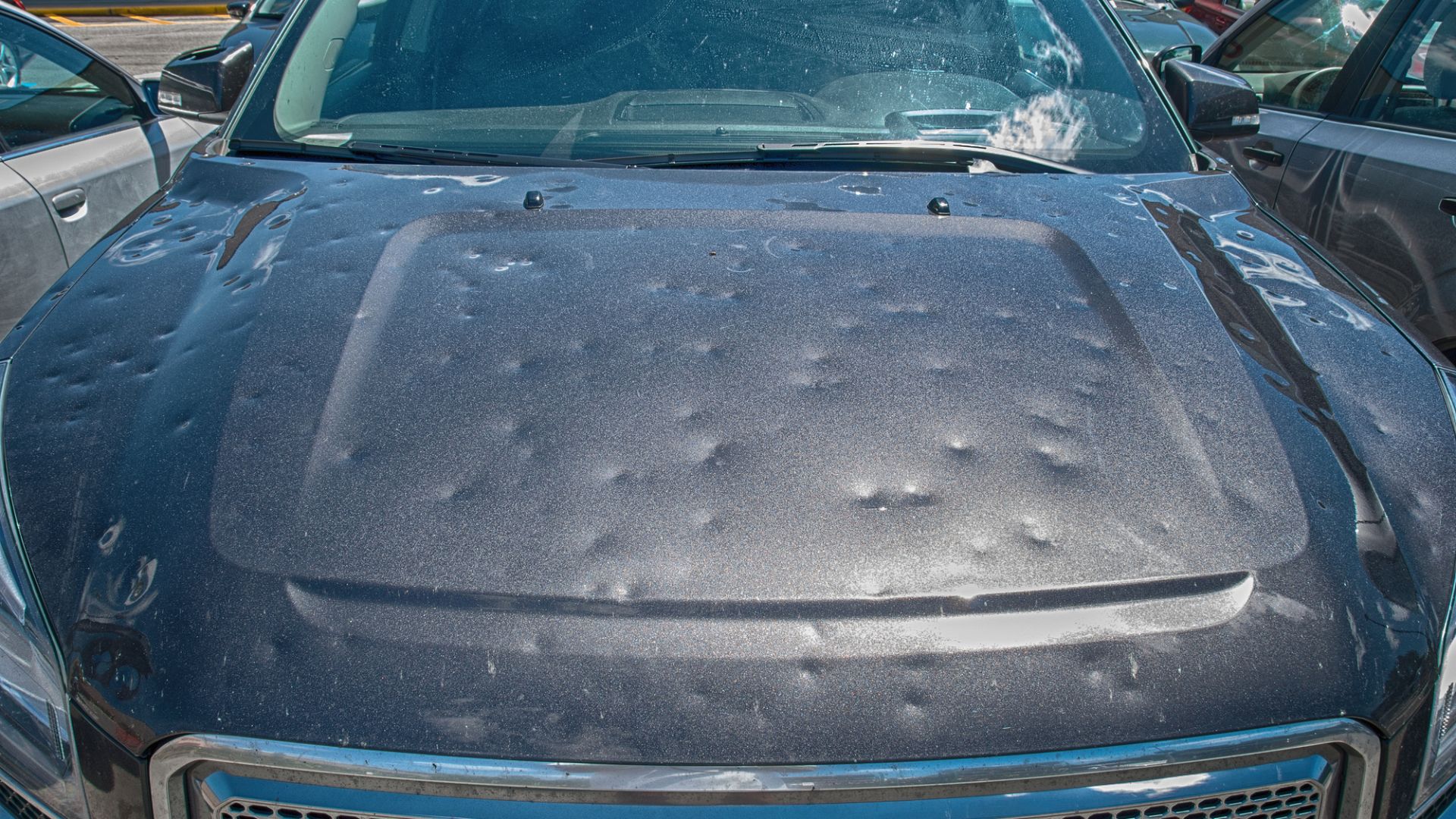

We may earn revenue from the products available on this page and participate in affiliate programs. Learn more ›
Despite the Mythbusters determining that, yes, golf ball-like dimples increase your fuel economy, your car’s dents don’t have the same effect. In fact, your dents may be decreasing your drag coefficient and killing your fuel economy. Know what that means? It’s the perfect time to fix your car’s dents.
Like reading spoilers on Twitter or scuffing up a new pair of shoes, dents are inevitable. Whether caused by an accident, an errant shopping cart, a sliced golf ball, or a fallen tree limb, dents can occur anywhere and quickly make your pristine ride look like yesterday’s garbage. Pulling them out, or repairing them, is something that almost anyone can do at home, so long as your car doesn’t resemble a “V” with your engine and trunk almost kissing each other.
So for all you readers out there with dent, bent, and dinged cars yearning to be fixed, follow along as The Drive’s crack team of editors details exactly how to fix your car’s dents without incinerating bags of cash.

Car Dent Repair Basics
Estimated Time Needed: 1-3 hours
Skill Level: Beginner-Intermediate
Vehicle System: Exterior
Common Car Dent Problems
We’ve all been there. You head into the grocery store, grab your peanut butter pretzels, head back to your car, and, oof, there’s a nice dent in your bumper and maybe a broken light housing. Some mouth-breather was too lazy to walk 13 feet, so his free-roaming cart gathered speed with the ferocity of a mating bighorn sheep and rammed your ride But car dents can happen elsewhere, too. Here are just a few of the possible reasons behind why your car now looks like the surface of a golf ball.
- Golf balls
- Hail
- Aforementioned grocery store heathens
- An accident
- Tree branches
- Children playing baseball or soccer too close to your ride (or kids practicing batting on your ride)
- And many, many others.

Car Dent Repair Safety
Working on your car can be dangerous and messy, so here’s exactly what you’ll need to ensure you don’t die, get maimed, or lose a finger and that you keep your jeans, shirt, and skin spotless—hopefully.
Everything You’ll Need To Repair a Car Dent
We’re not psychic, nor are we snooping through your toolbox or garage, so here’s exactly what you’ll need to get the job done.
Tool List
- Heat gun/blow dryer
- Dent repair puller
- Microfiber Towels
Parts List
- Bridge puller dent repair kit
- Compressed air
Organizing your tools and gear so everything is easily reachable will save precious minutes waiting for your handy-dandy child or four-legged helper to bring you the sandpaper or blowtorch. (You won’t need a blowtorch for this job. No, do not substitute the heat gun for a blow torch. And please don’t have your kid hand you a blowtorch—Ed.)
You’ll also need a flat workspace, such as a garage floor, driveway, or street parking. Check your local laws to make sure you’re not violating any codes when using the street because we aren’t getting your ride out of the clink.

Here’s How To Repair a Car Dent
There are four types of dents you should know about, including small and large dents in plastic, and small and large dents in metal. Before you start trying to fix them, determine what the dent is in and then proceed. Let’s do this!
Small Dents in Plastic
- Using the heat gun/blow dryer, heat up the dent.
- After it’s warm to the touch, shake the compressed air, flip upside down, and spray the area with the ultra-cool air.
- The dent should pop out by itself, though a suction dent puller may be needed.
You’re done!
Large Dents in Plastic
- Using the heat gun/blow dryer, heat up the dent.
- After it’s warm to the touch, attach the suction dent puller.
- Pull the dent out with the puller’s handle.
- You may need to heat the area up again to completely pull out the dent.
- You also might need to push out any smaller dents that appear during this process with your hands.That’s it!
Small Dents in Metal
- Wipe the area down with a microfiber towel to ensure there are no particulates that will cause a bad seal or damage your paint.
- With the provided glue gun from the dent repair kit, heat up the glue and apply about a tablespoon to two tablespoons of glue to the deepest point of the dent.
- Attach the provided bridge puller head to the glue and allow it to dry completely, about 4-8 minutes.
- Once dry, attach the bridge puller and slowly begin turning the dial to pull out the dent.
- After the dent has been removed, detach the bridge puller, and, using the heat gun, remove the leftover glue.
Congrats!
Large Dents in Metal
- Using the heat gun/blow dryer, heat up the dent.
- After it’s warm to the touch, attach the suction dent puller.
- Pull the dent out with the puller’s handle.
- Once you’ve reduced the dent’s overall size, switch to the bridge puller.
- Wipe the area down with a microfiber towel to ensure there are no particulates to cause a bad seal or damage your paint.
- With the provided glue gun from the dent repair kit, heat up the glue and apply about a tablespoon to two tablespoons of glue to the deepest point of the dent.
- Attach the provided bridge puller head to the glue and allow it to dry completely, about 4-8 minutes.
- Once dry, attach the bridge puller and slowly begin turning the dial to pull out the dent.
- After the dent has been removed, detach the bridge puller, and, using the heat gun, remove the leftover glue.
You’re done and your car looks great!
Touching Up Your Car’s Paint
After you’ve fixed the dent, you may need to touch up your car’s paint. Here’s how to do that.
- The key here is to keep your hand as steady as possible and to apply a small amount of primer or paint, increasing as you go. Remember, you can always add more paint, but removing it is a painful process. Stabilize your hand by pressing the heel of your hand on the surface and using it as a hinge.
- Use a small brush, toothpick, or other stick-like objects to apply a tiny amount of primer to the area you’re looking to touch up. Scratches and other small paint chips will only take a drop or two of primer.
- Let the primer dry. This will usually take an hour or so, depending on how large the primed area is.
- Make sure the touch-up paint is thoroughly mixed by shaking the bottle or stirring (if in a large can).
- Use the small brush or toothpick to apply touch up paint as evenly as possible. Take care not to apply the paint in a thick coat, which can lead to running or bubbling.
- Don’t sand or treat the painted area for a few days. If you can help it, let the vehicle sit for that period of time to allow the paint to dry and cure.
- Once the touch-up paint is completely dry, wash the vehicle thoroughly and polish it. This can help smooth out any imperfections in the touch-up paint and may help blend it with your vehicle’s existing paint color.

Get Help To Repair Car Dents From a Mechanic On JustAnswer
The Drive recognizes that while our How-To guides are detailed and easily followed, a rusty bolt, an engine component not in the correct position, or oil leaking everywhere can derail a project. That’s why we’ve partnered with JustAnswer, which connects you to certified mechanics around the globe, to get you through even the toughest jobs.
So if you have a question or are stuck, click here and talk to a mechanic near you.
How To Repair a Car Dent on a 1970 Opel GT’s Steel Unibody
We asked Guides & Gear’s very own Tony Markovich to provide his unique experience wrenching on his Opel to give us his best advice on how to remove a dent on any and all 1970 Opel GTs. Take it away, Tony.
- “Hit it with a hammer. Hard.”
Thank you, Tony!
Pro Tips To Repair Car Dents
Over the years, The Drive’s editors have made friends with professionals across the industry. That’s why we asked our pal Bozi Tatarevic, who’s owned automotive repair shops and a salvage vehicle rebuilding business, to give us pro tips for dent removal.
- “You don’t need a pro for many dent repairs. While a professional paintless dent repair service is recommended in many circumstances, most plastic dents can be popped out at home, and ones in metal that are in easily reachable places and not too complex can often be fixed with DIY kits.”
- “Taking your time is the best piece of advice when attempting to use a DIY method to remove a dent. Working too fast or putting too much force on a dent can often stretch the metal and may even pull the dent in the reverse direction.”
- “Complex dents and creases are often best left to the professionals because it is often hard to remove them without pro-level tools as it is very easy to damage the metal further or even crack the paint.”
FAQs About Repairing Car Dents
You’ve got questions, The Drive has answers!
Q: How Much Does It Cost To Repair Car Dent?
A: Your average cost of fixing a small to medium dent will be between $30-$100. Larger dents, multi-faceted dents, and more extensive dents across a car’s exterior will increase the price.
Q: How Often Do You Need To Repair Car Dent?
A: Well, you might want to consider it whenever you get a dent, especially if the dent is in metal, which can rust away.
Q: Is It Worth Fixing a Dent?
A: Yes! Fixing a dent can save you thousands of dollars later on if they’re in metal. Fixing dents also helps keep your drag coefficient down, which saves you money in fuel costs.
Q: Can All Dents Be Fixed?
A: Yes and no. If you’ve dented the exterior paneling, yes, the dent can be fixed. If you’ve dented the car’s frame or part of the car’s crash structure, it’s not advisable, as the car’s structural integrity is now compromised.
Q: Can Hot Water Fix a Dent?
A: It can! If you have a small concave dent in your plastic body panels, hot water can shock the plastic and pop the dent out like magic! Sometimes, though, you may need to help it along with either a dent puller or other form of suction mount.

Featured Products
ARISD Auto Body Paintless Dent Removal Tools Kit
Manelord Auto Body Repair Tool Kit
YOOHE Paintless Dent Repair Puller Kit
Got a question? Got a pro tip? Send us a note: guidesandgear@thedrive.com
